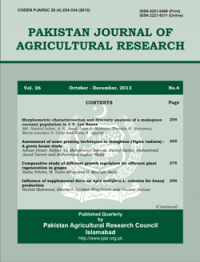Assessment of Heritability, Variability and Genetic Advance for Yield Linked Factors Related to Diversify Psyllium (Plantago ovate L.) Germplasm in Arid Conditions
Assessment of Heritability, Variability and Genetic Advance for Yield Linked Factors Related to Diversify Psyllium (Plantago ovate L.) Germplasm in Arid Conditions
Malik Muhammad Yousaf1, Wali Muhammad1, Muhammad Mohsin Raza1*, Mumtaz Hussain1, Muhammad Jahangir Shah1, Bashir Ahamad1, Annum Sattar2, Hera Gull3, Sonia Sumreen4, Malik Waqar Yousaf5, Nazakat Nawaz6 and Nazim Hussain7
ABSTRACT
Plantago ovate (Psyllium), an important medicinal herb at the global level, grown in winter season. Determination of heritability and genetic variability within Psyllium is a baseline strategy for the improvement of psyllium improving program. This investigation was designed to assess the heritability and genetic diversity among fifty-eight (58) psyllium genotypes. Data on eight yield linked factors, i.e., Days to floral initiation (DFI), Days to 50% flowering (DF), number of tillers per plant (NTPP), plant height (PH), spike length (SPL), number of spikes per plant (NSPP), days to maturity (DM) and seed yield per plant (SYPP) were recorded. Estimates of heritability values were high in SYPP and DF ranged from 0.998 to 0.930, respectively, like all characters except DFI noted as 0.658 whereas genetic advance ranged between 16.3069 in the parameters i.e., NTPP and 1.4473 for the character of SYPP. Highest coefficient of variation (CV=11.53%) was estimated for SPL followed by SYPP (CV=8.04%), while minimum (CV=1.41%) for DM. Likewise, seed yield per plant also reflected significant results among the fifty-eight genotypes. In all trails genotypic coefficient of variability (GCV) was found lesser then phenotypic coefficient of variability (PCV). Principal component analysis showed that first three PCs reflected eigen values more than one where cumulative value was 61.78% of the total variability. The first one accounted as highest proportional value of total variability in all PCs and in remaining PCs lesser amount of variation. High values of heritability referred to broad sense genetic advance possessing higher values in plant attributes under study witnessed that these parameters abide by the effects of additive genes, concluding that sorting of superior germplasm may direct the quick heritable improvement of the material.
To share on other social networks, click on any share button. What are these?






